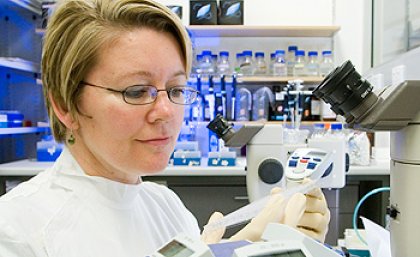
The University of Queensland has received two prestigious new national fellowships, targeting research into improved coral reef management and an alternative to antibiotics.
UQ’s Australian Laureate Fellowships are among only 15 selected from a nationwide field of 148, and are the only fellowships awarded to a Queensland university.
One of the University’s fellows, Professor Peter Mumby of the United Kingdom, is the sole expert to be attracted to Australia under the ‘foreign nationals’ category of this scheme.
Professor Mumby and Professor Jennifer Martin, of UQ’s Institute for Molecular Bioscience, will each receive a major package of grant support, with average funding exceeding $2.7 million over five years for each successful Fellow.
Professor Martin will aim her fellowship at developing a new class of antibacterial drugs that may avoid the problems of antibiotic resistance.
Antibiotics were one of medicine’s most significant breakthroughs, but their usefulness has been undermined as bacteria develop resistance to them.
“The lack of drugs effective against some disease-causing bacteria is shaping as a potential crisis,” Professor Martin said.
“Bacteria develop resistance because antibiotics work by killing most bacteria, leaving only the resistant bacteria alive.
“My research will address this by developing compounds that won’t kill bacteria, but rather will inactivate a specific bacterial machinery responsible for causing disease.”
She said bacteria cause disease by producing molecules called virulence factors, which require a type of chemical bond, disulfide bonds, to function.
Professor Martin will develop drugs that target the bacterial machinery that triggers the insertion of disulfide bonds into virulence factors.
“Infectious bacteria with mutations in their disulfide bond machinery are incapable of causing disease, highlighting the importance of this machinery in bacterial virulence, and the potential to develop an entirely new class of antibacterials that may avoid bacterial resistance mechanisms,” she said.
Professor Mumby will move to UQ from the University of Exeter to research coral reef remote sensing, an area in which he is the world’s most highly-cited researcher.
He aims to quantify the impacts of climate change on coral reefs and harness remote sensing technology and ecological modelling to provide new tools for reef management.
The outcomes of this research will help government bodies adapt management of marine production systems to take account of climate change, and thereby help ensure the sustainable delivery of ecosystem services including tourism, recreation, fisheries, and the sustainability of Australia’s marine biodiversity.
Professor Mumby’s research, which sits at the interface of remote sensing and ecology, has wide-ranging applications to the conservation of natural resources.
UQ Vice-Chancellor, Professor Paul Greenfield, congratulated Professors Martin and Mumby.
“These new Australian Research Council awards, which evolved from the former Federation Fellowships, will build the next generation of research capability in our nation, and allow early-career researchers at UQ to work alongside internationally renowned Laureates,” Professor Greenfield said.
“This will enhance UQ’s strong research training environment, and add to Australia’s current and future stature in the international research race.”
Media: Andrew Dunne at UQ Communications (07 3365 2802 or 0433 364 181).


